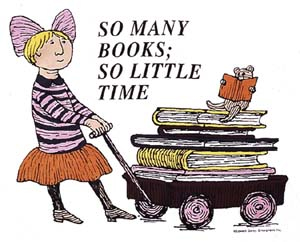FINDING NOVELS
What led you to pick that novel you’re reading? A friend’s recommendation? A book review? A bookstore display? Did your book club make you do it?
Last month I put out an informal poll to find out if social media made a difference in the way people were finding novels. I discovered some intriguing new ways to find reading material—plus a few surprises.
Tried and True
Not surprising was that many people are finding novels using fairly traditional methods: the long-reigning print book reviews (especially the New York Review of Books and The New York Times Book Review), author interviews, and book club lists. Very few people said they still found most of their fiction by browsing bookstore shelves, but several mentioned library recommendations.
By far the most common way people said they are finding novels, though, was through family and friends.
In some cases it takes more than one of these trusted recommenders to seal the deal. As my daughter Sage Snider explained, she’s reading Sinclair Lewis’ Babbitt right now in part because a friend whose literary taste she trusted told her it was relevant to contemporary politics. However, she would not have acted on this recommendation had she not already heard her brother and me recommend the same book.
“I rarely take novel recommendations unless they come from people who both know books and me extremely well,” she said.
Building on what you’ve liked before certainly emerged as a great way to find a novel. Many people mentioned that their parent or child was often the most trustworthy source of recommendations, mainly because these close family members understood their reading tastes.
Others basically recommended books to themselves for the very same reason. Several people told me that the best way of finding novels that they were almost certain to enjoy just took watching for new novels by their favorite authors.
Books Don’t Find People. People Find Books
My poll was hardly scientific. But, still, it was striking that absolutely no one chose novels based on search engines or tweets in the night. Or at least no one admitted it
 Even so, social media is clearly ascending as an excellent way of finding novels. A few respondents said they still enjoyed finding books by browsing shelves at the library or book stores, But many more preferred social media review sites.
Even so, social media is clearly ascending as an excellent way of finding novels. A few respondents said they still enjoyed finding books by browsing shelves at the library or book stores, But many more preferred social media review sites.
“During the past few years I’ve read many novels that were reviewed in the Skimm and really enjoyed them,” Nancy Daffner told me. “It’s become a ‘go to’ for me over browsing the library shelves. When the books are free, I am fine with reading a chapter or two to determine if I want to read the remainder.”
One thing became clear when it came to social media: Books don’t find people. People find books. No one said they found reading material by following a search engine’s suggestions or reading whatever crossed their Facebook feed. Instead they deliberately went to specific websites such as themillions or theSkimm, or lists of prizewinning novels like PEN AMERICA’s Literary Awards Shortlist.
New to me was bookbub, a website that asks you what you like to read and then alerts you to free and discounted books matching your interests to be read on your Nook, Kindle, or other device. Another fascinating website is largehearted boy, which not only includes blogs reviewing books but asks authors to provide musical playlists for their novels. One mystery aficionado even said she discovered Henning Mankell‘s crime novels via video websites such as Masterpiece Mystery! and Netflix.
Are People Even Reading Fiction Anymore?
Probably the most unsettling responses I got to my little poll were those from people who rarely read novels, or fiction, at all.
“I haven’t been able to read fiction since Nov. 8—only history,” said Jeanne Stewart Gallagher. “I’m reading the Hamilton biography now. It’s strangely comforting to read about how divided and tense things were back then too.”
Kelly Howells said she simply doesn’t enjoy stories as much as information and ideas. She knows that novels are filled with ideas but notes “it’s just so much work to dig them up.” Although she is “trying to reform,” she rarely reads novels unless she knows the author. I must admit that sounds like a great idea! Not that I’m biased or anything….
One thing was clear: whether people were looking for fiction or non-fiction, searching online or in-person, finding good books is all about trusting your sources. The key to finding novels you like isn’t automated “customization”—like an Amazon or Google “suggestions.” The key to finding novels you like is knowing your source, and, even more so, knowing yourself.
Terra Ziporyn
TERRA ZIPORYN is an award-winning novelist, playwright, and science writer whose numerous popular health and medical publications include The New Harvard Guide to Women’s Health, Nameless Diseases, and Alternative Medicine for Dummies. Her novels include Do Not Go Gentle, The Bliss of Solitude, and Time’s Fool, which in 2008 was awarded first prize for historical fiction by the Maryland Writers Association. Terra has participated in both the Bread Loaf Writers Conference and the Old Chatham Writers Conference and for many years was a member of Theatre Building Chicago’s Writers Workshop (New Tuners). A former associate editor of the Journal of the American Medical Association (JAMA), she has a PhD in the history of science and medicine from the University of Chicago and a BA in both history and biology from Yale University, where she also studied playwriting with Ted Tally. Her latest novel, Permanent Makeup, is available in paperback and as a Kindle Select Book.
- Web |
- More Posts(106)
